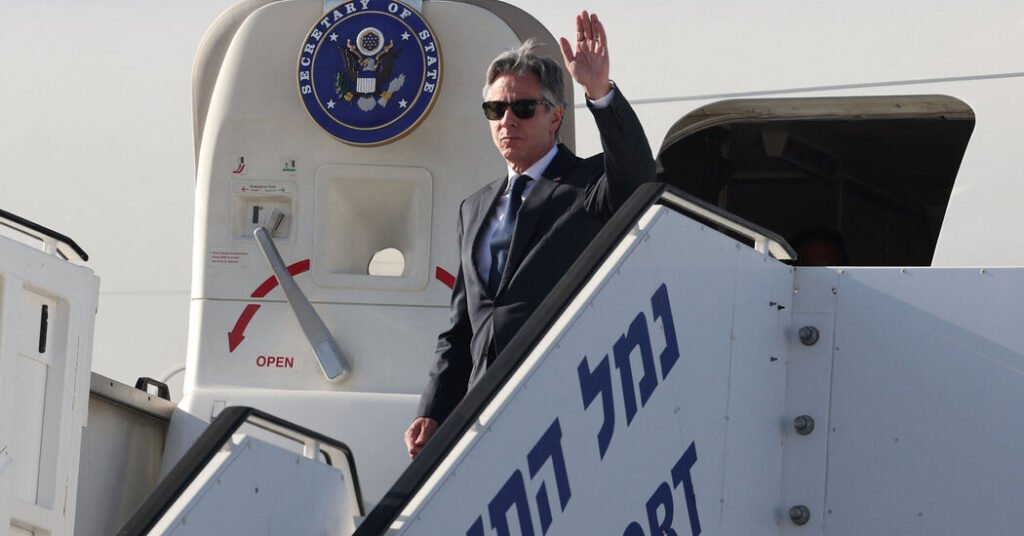The day after Israeli forces rescued four hostages held by Hamas fighters in Nuseirat, Gaza residents reported heavy shelling during the raid and subsequent chaos in the streets that left numerous Palestinians dead and injured.
Bayan Abu Amr, 32, was holding his 18-month-old son Mohammed on the edge of Nuseirat’s main market on Saturday when he was surrounded by the loud blasts of aircraft that the Israeli army said were targeting militants to ensure the safe rescue of hostages and special forces.
“People were rushing like it was Doomsday. We didn’t know where to run,” said Abu Amr, who was on his way to pay his respects to his uncle’s family after his two sons were killed. “Children were screaming and women were running and collapsing.”
She recalled how she and other Gazans managed to clamber onto a passing pickup truck that was helping evacuate people to safety during the airstrikes. In the confusion, she said, one little girl got separated from her mother, and an elderly man lost his grip and fell off the truck to the ground.
Abu Amr finally returned home with her son hours later and was shocked to find she was still alive. “I will never take my son out of the house again,” she said.
Israeli forces stormed into two homes where the hostages were being held to rescue them, according to Israeli military spokesman Maj. Gen. Daniel Hagari. Hagari said it was “impossible to get to the hostages without harming Gaza civilians” because the apartments were occupied by families and armed Hamas fighters were guarding them.
With hospitals in disarray, the exact death toll remains unclear as health officials try to compile statistics. Gaza health officials reported that more than 200 people were killed in the attacks. The Israeli military said it was aware of fewer than 100 casualties, but did not say whether they were dead, wounded, or both. Neither side gave a breakdown of combatants and civilians.
More than 100 bodies were brought in on Saturday and the corridors and halls of Al-Aqsa Martyrs Hospital in Deir al-Balaf, central Gaza’s last major medical center, remained “crowded” with new patients on Sunday, hospital official Khalil Dakran said. Most of the bodies have since been buried or collected by relatives, he added.
In nearby Nuseirat, medical facilities that were already full before the Israeli rescue effort began were overwhelmed, said Abdelkarim Al-Harazzin, 28, a doctor working there.
“The bombing was unimaginably intense,” Dr Al-Haradin said. “The whole hospital became like a giant emergency room as people flocked to search for their lost relatives.”
When Al-Aqsa was overwhelmed, many of the wounded were taken to a nearby field hospital run by International Medical Mission, aid group official Javed Ali said.
Diana Abu Shaban, 28, was hanging out laundry near the tent where she was sheltering in Nuseirat when she first heard gunfire. As attacks intensified, she urged her daughters to hide, but realized the flimsy tent would not protect them. She gathered her children and made a desperate run for safety to the nearby Al-Awda Medical Center.
Her husband, Said, had left early that morning for the market, where Palestinian residents said the attack was particularly fierce.
“We heard a lot of missiles,” Abu Shaban said. “We thought my husband was going to be killed or injured.”
After two hours, the bombing subsided and she and her children left the hospital, later discovering that her husband had survived by hiding in a nearby shop.
Abd al-Rahman Bassem al-Masri, 25, who lives on the northern edge of Deir al-Balah, said Saturday was the worst day since the war began.
Al-Masri said he, his mother and his brother were driving back from his uncle’s house and were approaching their home when an airstrike hit the ground next to their house.
Video taken by a friend who was also in the car showed a wide cloud of smoke rising behind the building. “At that moment, we lost hope that we could continue living here,” Al Masri said.
Another Gazan in Nuseirat, who spoke on condition of anonymity for fear of retaliation, said he and more than 10 family members hid in their home for several hours as heavy airstrikes shook their neighborhood and were unaware that hostages were being held in the area.
After the bombing subsided, he said he went to a destroyed market area where he saw streets covered in blood and corpses. He said Gazans were cursing not only Israel but also Hamas, blaming them for bringing this disaster on them.
He said he was not concerned about the vandalism because Israel and Hamas were attacking each other, adding that the victims were civilians.

